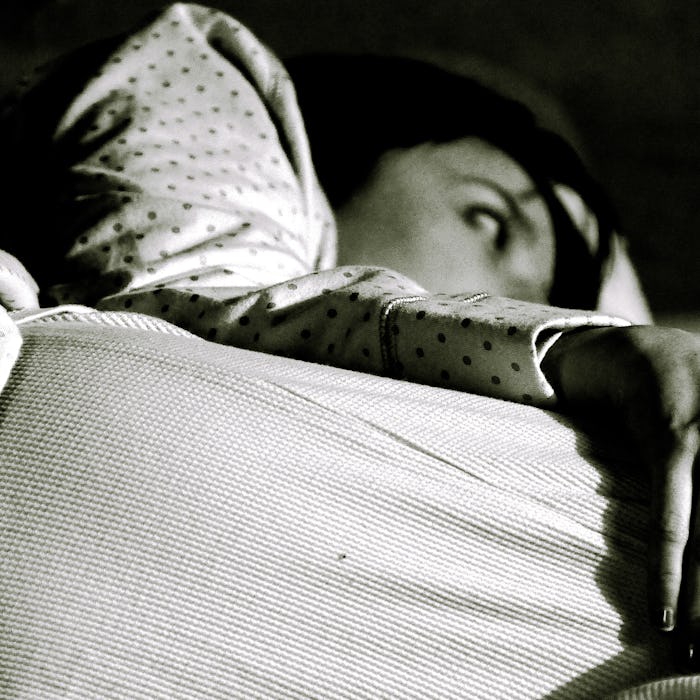Life

7 Foods to Avoid Before Bed So You Can Actually Sleep at Night (Unless You Want to Watch More Netflix)
These days, women are lucky if they can catch a few hours of shut eye, let alone the recommended 8 hours of sleep each night. Of course, a hectic schedule is only part of the problem. Many factors contribute to your lack of Zs, including certain foods that may disrupt your sleep.
Just as there are some snacks that can lull you sleep, there are others that leave you lying in bed with your eyes wide open. (Sleep can also affect what you eat, but that’s a whole other conversation we can dive into at a later date). Not to mention, overall eating habits weigh heavily on your sleep patterns. A 2013 study from the University of Pennsylvania found that short sleep duration is often associated with weight gain and obesity, as well as a low-intake of nutrients like folic acid, phosphorus, iron, zinc.
But let’s be honest, tracking your nutrient intake is no easy task, especially when you’re often shoving sustenance into your mouth because you’re too busy to sit down and eat. So rather than reading labels and pulling out calculators, simply eliminate certain foods from your diet (or at least, right before bedtime.) By cutting back on these seven foods, you may finally get a better night’s sleep.
1Spicy Food
The jury’s still out on whether spicy foods can cause nightmares (like Chipotle charging even more for guac), but there’s no doubt that they prevent you from getting a good night’s sleep. In 2010, the Journal of Neurogastroenterology and Motility released a study indicating that spicy foods can cause gastroesophageal reflux disease (GERD), which disrupts sleep. So unless you have a stomach of steel or are happy popping Prilosec before bed, you should limit your spice intake at dinner time.
2Alcohol
My personal experience suggests a post-work cocktail helps you decompress and drift off to dreamland. But scientist say a little libation may lead to a restless night. A 2013 study from Alcoholism: Clinical and Experimental Research found that alcohol disrupts and decreases REM sleep, resulting in a lot of tossing and turning on your end. As much as I hate to be wrong, I also failed chemistry, so it may be wise to listen to the smarty pants on this one.
3Aged Cheese And Cured Meat
Charcuterie may not be your go-to nighttime snack, but if you plan on indulging at happy hour then you may suffer when it’s time to sleep. Both aged cheese and cured meat contain tyramine, an amino acid that causes the release of norepinephrine, a brain stimulant. With your mind operating on over-drive, falling asleep will be next to impossible.
4Caffeine
You know better than to down a double shot of espresso before bed. At least, I hope you do. But coffee isn’t the only source of caffeine out there. This stimulant lurks in an array of foods, from the obvious soda and chocolate to the more subtle like pain relievers (Health reports that two Excedrin Migraine tablets have the same amount of caffeine as a Starbucks Light Frappuccino with espresso.) Not only should you skip caffeinated fare right before you hit the hay, but you should be mindful of your consumption throughout the day. According to the National Sleep Foundation, it takes up to six hours for half the caffeine to leave your body. Consider trading your afternoon joe for its decaf counterpart, or switch to herbal tea, which contains flavonoids that encourage sleep.
5Acidic Foods
Like spicy cuisine, foods high in acid contribute to acid reflux and GERD, a condition that causes many sleepless nights. If you insists on eating lemons before bedtime (hey I’m not here to judge anyone’s pre-bedtime rituals), EverydayHealth.com suggests eating three to four hours before hitting the hay.
6Water
Drink a glass of water before bed, and you’ll likely find yourself in the bathroom later. Registered dietitian Joy Bauer told Today that it takes 90 minutes for the body to process liquids. Put an end to your nightly toilet trips, and don’t consume any liquids at least an hour and a half before going to sleep.
7Fatty Foods
There’s no shame in indulging in a Big Mac after a stressful day (or, hey, a day that ends in “y”). You may even feel like their special sauce and decadent shakes may help you wind down (thus the phrase “food coma.” But don’t expect that to last long. A 2012 study presented by the Society for the Study of Ingestive Behavior found that a high-fat diet results in disrupted sleep patterns. That’s not say you can’t enjoy a cheeseburger, but you may want to throw in a salad every so often.
Images: Courtesy of Alyssa L. Miller, Momo, Ken Hawkins, missbossy, Wafer Board, Sarah Laval, Beatrice Murch, Janine/Flickr